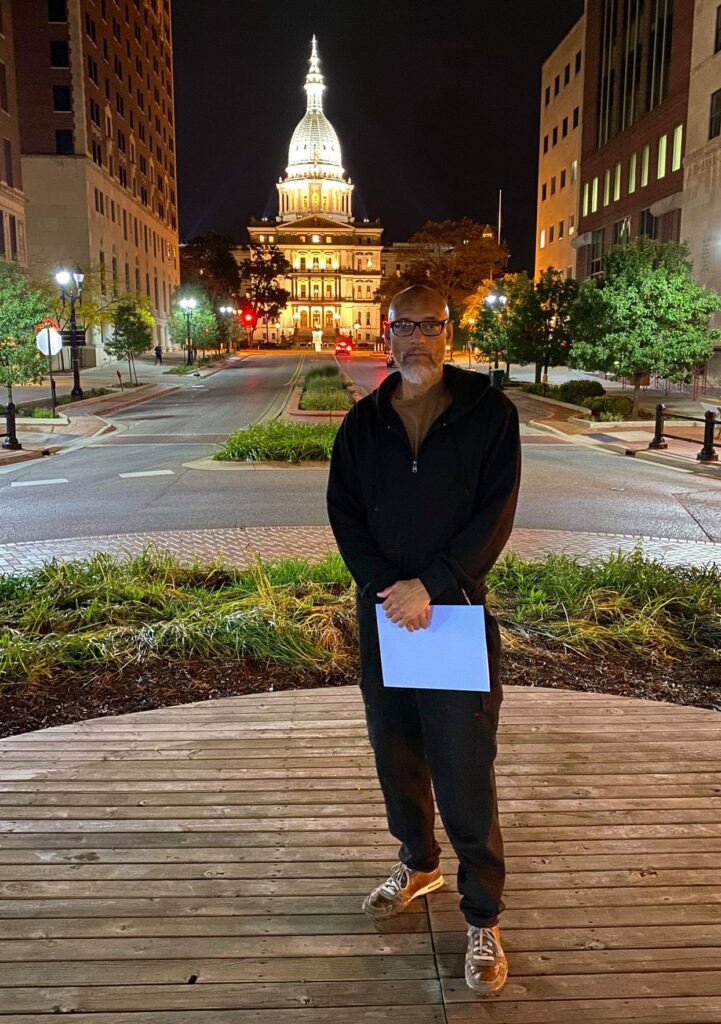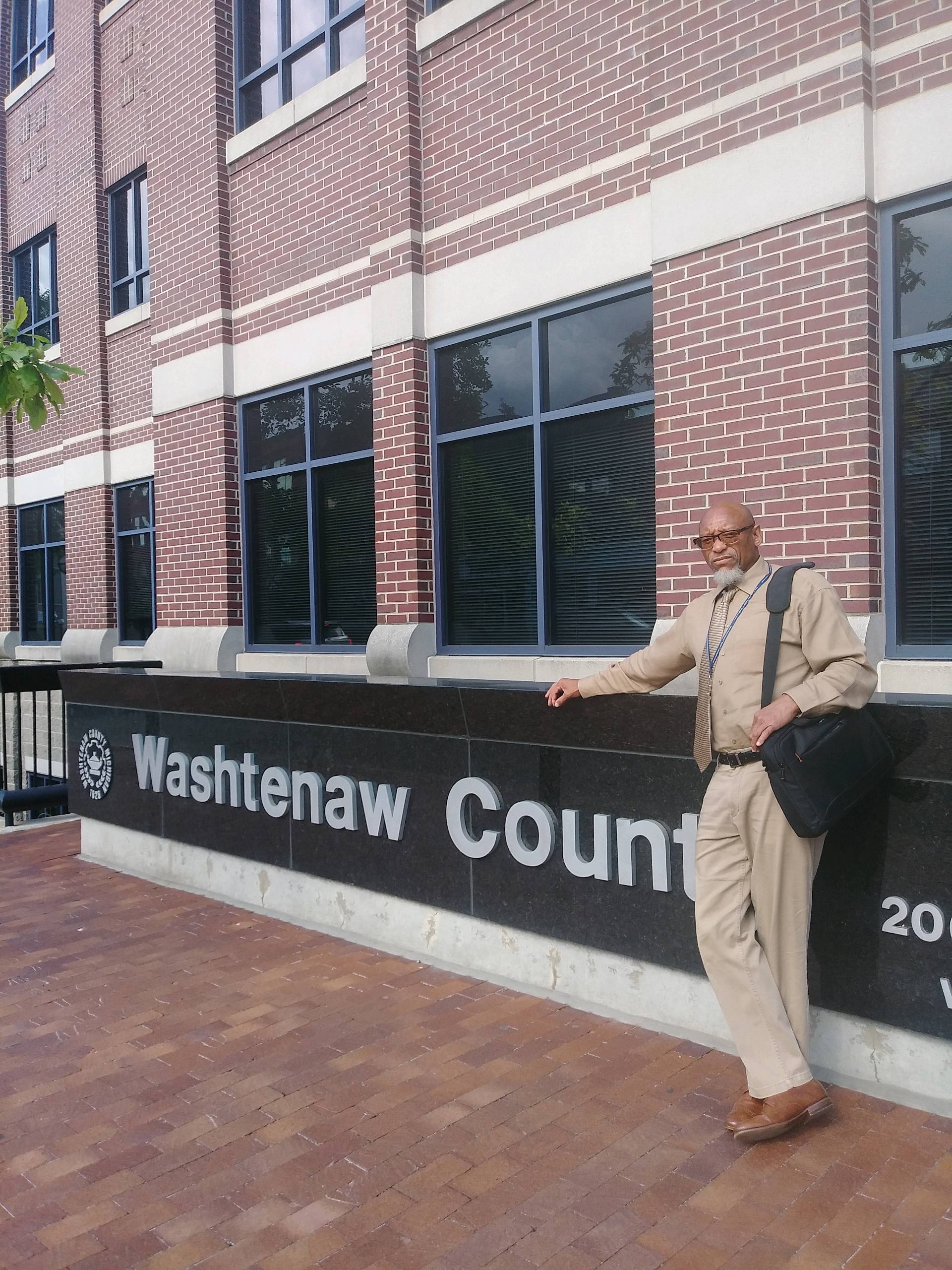Former juvenile lifer Edward Sanders starts work for Washtenaw County’s Conviction Integrity & Expungement Unit
(Safe & Just Michigan first interviewed Edward Sanders, a former juvenile lifer, in July 2018, after he had been released from prison for about a year. Since then, he has contacted us periodically to keep us up-to-date on what his life has been like since then. He recently reached out to us to give us some significant news.)
When he was 17, Edward Sanders stood before a judge who told him he’d spend the rest of his life in prison — but that didn’t happen. One of Michigan’s juvenile lifers, he got a chance for freedom more than 42 years later because the U.S. Supreme Court ruled that all juvenile lifers deserved a chance for a resentencing. When Sanders finally got his in 2017, he was released.
Anyone could forgive Sanders if he never wanted another thing to do with the justice system after that. Instead, he’s running toward it as fast as he can. Sanders, who received a master’s degree in social work from the University of Michigan earlier this year, started a job with the Washtenaw County Conviction Integrity & Expungement Unit in late June. That’s not all — he’s also hoping to start law school soon.
“I’m not the kind of person who can perpetually be at rest. I wake up early in the morning and I need something to do,” Sanders said. “I want to combine both social service and law — to combine knowledge instead of putting it into silos. What I want to do is bring about more transformational reform and work towards abolition.”
For Sanders, it’s all a part of communing with his creator. Helping others and working to bring about systemic change to the criminal justice system are two of the things that make his life meaningful. And that’s why he’s so excited about his new job in the prosecutor’s office.
Sander’s won’t be involved in the prosecution of anyone. Quite the opposite, he will be investigating possible wrongful convictions with the aim of releasing people who are currently incarcerated.
“It feels very exciting,” Sanders said. “I’m very excited for this county, and excited to be working with so many dynamic people. (Assistant Prosecuting Attorney) Victoria Burton Harris is someone I have so much respect for, and (Washtenaw County Prosecutor) Eli Savit clerked with a Supreme Court justice.”
Savit didn’t just clerk for any Supreme Court justice, Sanders noted. He worked for Justice Ruth Bader Ginsberg, who helped decide the 2012 Miller v. Alabama ruling that gave juvenile lifers like himself a chance for a resentencing. She later sided with the majority in the 2016 Montgomery v. Louisiana ruling that made the Miller case retrospective for people like Sanders who had been incarcerated for decades. Savit clerked for Justice Ginsberg from 2014-15.
But — as is typical for Sanders — he doesn’t view landing this job as achieving an end goal. His new position is crucial in correcting errors after the fact. He envisions a future where those errors don’t happen in the first place.
“I would like to help advocate for policy change,” Sanders said. “This is about being responsible and having policies to prevent wrongful convictions in the future.”
For Sanders, bringing about transformational criminal justice reform is rooted in his spirituality. As a child growing up in Detroit, he lived near both Malcom X’s house and the church where Aretha Franklin’s father was a pastor. He went to a Catholic summer camp that instilled in him the value of providing service to others.
After he was sent to prison, that need to be of service didn’t die out.
“I was not going under the rock that was intended for me to go under,” he recalled. “I was going to use it as an educational experience.”
Sanders hit the law books and became a paralegal. He used what he learned to help other people in prison prepare for their court dates.
“A former prisoner used to call me a civil rights attorney. I took offense to that,” he said with a laugh. “I saw myself as more of a Black power type. But now I see it”
Sanders now wishes that others who see themselves as spiritual or religious would draw on their faith and become involved in the fight for criminal justice reform. After all, he reasons, values like redemption, second chances and forgiveness are literally written into the texts of all major faith traditions.
“I would ask the clergy that no matter what type of politics you get into, don’t ever give up on the idea of pardons and reprieves,” Sanders said. “Bring your sense of grace and mercy with you.”

Edward Sanders stands in front of the Michigan State Capitol. Photo courtesy of Edward Sanders.
Get help from Washtenaw County’s Conviction Integrity & Expungement Unit
Edward Sanders is part of a team at the Washtenaw County Conviction Integrity & Expungement Unit that plans to investigate possible wrongful convictions and bring select cases before the court for possible action, such as a rehearing, resentencing or vacating of a conviction.
The Conviction Integrity & Expungement Unit is currently operating in an interim capacity—thanks to swift action taken by Washtenaw County at the start of Prosecutor Savit’s tenure. Final consideration of the Unit by County government is still pending.
Even once the Unit is fully operational, Sanders cautioned, the Conviction Integrity & Expungement Unit isn’t meant to be for everyone.
“This is for people who were convicted in Washtenaw County who have issues of innocence,” he said, emphasizing that the Conviction Integrity & Expungement Unit was not the place to go with concerns over conditions of confinement, abuse, parole denial or other problems that might arise in prison. “We understand that being in prison is not an easy thing, but we ask that those individuals (without a claim of innocence) be respectful of those who are actually innocent so that down the line, we can work with the Legislature on issues of expungement, sentencing and parole.”
If people try to use the Conviction Integrity & Expungement Unit as a way to call attention to their complaints about conditions of confinement or other unrelated problems, it will only slow down the delivery of justice to innocent people while backfiring on those who tried to jump the line, Sanders said.
“It can take as much as 10 years to prove a claim of innocence,” Sanders said. “You don’t want to be the reason why someone who was innocent got held in prison for 10 years, because you were clogging up the system with your review. Don’t kill your credibility by getting in every line that forms.”
A number of exonerations have made the news in Michigan lately, including a man who was wrongfully convicted for murder but exonerated when a car rental company receipt showed he was returning a rental vehicle miles away from the crime scene at the time of the murder. Another man who had served 32 years of a life without parole murder sentence was released when it became clear that his conviction — based on bite mark comparisons — didn’t hold up to scientific scrutiny. DNA analysis that wasn’t yet available at the time of his conviction also proved he wasn’t responsible for the death.
These are the kinds of factual issues Sanders said the Washtenaw County Conviction Integrity & Expungement Unit is interested in investigating. While legal paperwork will be needed once a case is opened, Sanders said people who have a claim of innocence don’t have to hire a lawyer to get the attention of the unit.
“We would ask people with those kinds of issues to write the facts down and share it with the prosecutor’s office,” he said. “Don’t do the investigating yourself — don’t contact witnesses or do anything like that. Send us a letter and lay out the facts. You don’t need a legal document to bring it to our attention. All you need a pencil and a piece of paper.”
Requests for review can be sent to:
Washtenaw County Conviction Integrity & Expungement Unit
Washtenaw Co. Prosecutor’s Office
200 North Main – 3rd Floor
Ann Arbor 48104

